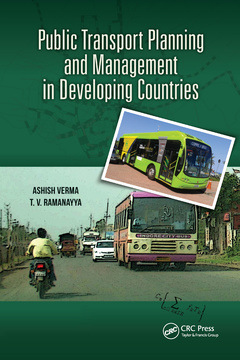Public Transport Planning and Management in Developing Countries
Auteurs : Verma Ashish, Ramanayya T.V.

Developing Countries Have Different Transportation Issues and Requirements Than Developed Countries
An efficient transportation system is critical for a country?s development. Yet cities in developing countries are typically characterized by high-density urban areas and poor public transport, as well as lack of proper roads, parking facilities, road user discipline, and control of land use, resulting in pollution, congestion, accidents, and a host of other transportation problems. Public Transport Planning and Management in Developing Countries examines the status of urban transport in India and other developing countries. It explains the principles of public transport planning and management that are relevant and suitable for developing countries, addresses current transportation system inefficiencies, explores the relationship between mobility and accessibility, and analyzes the results for future use.
Considers Socioeconomic and Demographic Characteristics
It?s projected that by 2030, developing nations will have more vehicles than developed nations, and automated guided transit (AGT) and other transport systems will soon be available in India. This text compares five cities using specific indicators?urbanization, population growth, vehicle ownership, and usage. It determines demographic and economic changes in India, and examines how these changes have impacted transportation demand and supply, transport policy and regulations, and aspects of economics and finance related to public transport. The authors emphasize preserving and improving existing modes, efficient use of the public transport management infrastructure, implementing proper planning measures, and encouraging a shift towards sustainable modes. They also discuss sustainability in terms of environment, energy, economic, and land use perspectives and consider the trends of motorization, vehicle growth, modal share, effects on mobility and environment, and transport energy consumption and emissions.
Public Transport Planning and Management in Developing Countries
Introduction. Demography and Settlement Patterns. Different Modes and Their Characteristics. Current Scenario of Public Transport (PT) in Developing Countries. Public Transport Planning in Rural Areas. Public Transport Planning In Urban Areas. Management of Public Transport. Resource Needs for Public Transport. Economics of Public Transport. References and Bibliography. Index.
Dr. Ashish Verma holds a Ph.D. from IIT Bombay and is currently serving as an assistant professor of transportation engineering at the Department of Civil Engineer and the Center for Infrastructure, Sustainable Transportation, and Urban Planning (CiSTUP) at the Indian Institute of Science (IISc), Bangalore, India. He has authored more than 70 research publications in the areas of sustainable transportation and road safety. He is an editorial board member of leading international journals of the American Society of Civil Engineers (ASCE) and other publishers. More details about him can be seen on his home page at http://civil.iisc.ernet.in/ashishv/.
Professor T. V. Ramanayya
Date de parution : 12-2020
15.6x23.4 cm
Date de parution : 12-2014
15.2x22.9 cm
Thèmes de Public Transport Planning and Management in Developing... :
Mots-clés :
Foot Paths; Waiting Time Constraint; Demography and Settlement Patterns; Total Objective Function; Different Modes and their Characteristics; Nested Logit Structure; Current Scenario of Public Transport (PT) in Developing Countries; State Road Transport Corporation; Public Transport Planning in Rural areas; Delhi Transport Corporation; Public Transport Planning in Urban areas; PUBLIC TRANSPORT COMPANY; ST ST ST; City Transport Network; ST ST; Private Buses; Circle Response; BMTC; Rail Corridor; High Occupancy Vehicles; Reversible Lanes; Motor Vehicle Taxes; 750V DC; Flat Fare; SERVQUAL Framework; Public Transport Planning; Maharashtra State Road Development Corporation; Transportation Master Plan; MMR; Rural Public Transport



